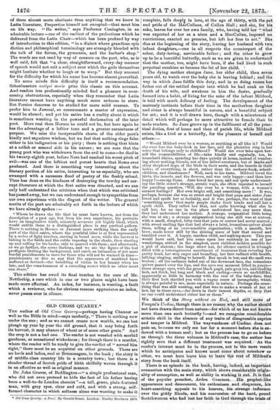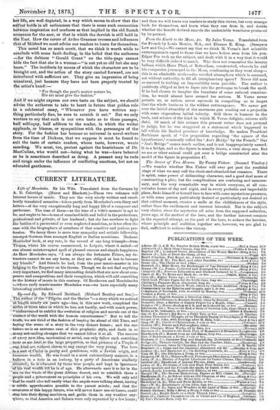OLD CROSS QUARRY.* THE author of Old Cross Quarry—perhaps having
Chaucer as well as the Bible in mind—says modestly, " There is nothing new under the sun ; and as we cannot create new worlds, we can but plough up year by year the old ground, that it may bring forth its harvest, it may chance of wheat or of some other grain." And the crop is not a bad one. The reader is not wearied with morbid goodness, or sensational wickedness ; for though there is a murder, where the reader will be ready to give the verdict of " served him right," there must be an acquittal on other grounds. There are no lords and ladies, real or Brummagem, in the book ; the story is of middle-class country life in a country town ; but there is a slender thread of Scotch pride of birth skilfully woven through it in an effective as well as original manner.
Dr. John Graves, of Beddington—" a simple professional man, who did not even pretend to bide the fact of his father having been a well-to-do London chemist "—a tall, grave, plain-featured man, with grey eyes, clear and cold, and with a strong, self- formed character in which softness alone was wanting to make it
• Old Cross Quarry : a Nord. By Gerald Grant. London: Tinsley Brothers. 1871.
complete, falls deeply in love, at the age of thirty, with the pet and pride of the IllacCullans, of Cullen Hall ; and she, for his sake, leaves for ever her own family, who, having told her " what was expected of her as a niece and a MacCullan, imposed no restrictions, exacted no promise, but left her free to act." She dies at the beginning of the story, leaving her husband with two infant daughters,—one in all respects the counterpart of the sober, duty-loving, serviceable father ; and the other to grow up to be a beautiful butterfly, such as we are given to understand that the mother, too, might have been, if she had lived in such perpetual sunshine as became the lot of her child. • The dying mother charges Jane, her elder child, then seven years old, to watch over the baby she is leaving behind ; and the way in which Jane fulfils this duty, and in so doing rouses her father out of the settled despair into which he had sunk on the death of his wife, and awakens in him the desire, gradually formed into a habit, of living for the sake of the infant Mildred, is told with much delicacy of feeling. The development of the matronly instincts before their time in the motherless daughter and sister is always beautiful in nature, and a beautiful subject for art ; and it is well drawn here, though with a minuteness of detail which will perhaps be more attractive to female than to male readers. So Jane grows up in the fulfilment of all the prac- tical duties, first of home and then of parish life, while Mildred exists, like a bird or a butterfly, for the pleasure of herself and others:—
" Would Mildred over be a woman, or anything at all like it? Would she ever lose the baby-look in her face, and the plaintive ring in her voice that belongs only to childhood? Would she ever take upon her- self the responsibilities of life—take kindly and regularly, too, to household duties, spending her days quietly at home, instead of wander- ing about making friends, not of her fellow-creatures, but of lambs and stray shepherd dogs, of the birds in their nests, and the insects in their holes; of everything, in short, rather than the cookery-book, school- children and almshouses ? Well, each to his taste. Mildred loved the birds, the insects, and the flowers, and was only happy—and then how happy !—among them. Jane loved her poor, and not quite understand- ing the little sister's strange, erratic ways, she often repeated to herself the puzzling question, ' Will she ever be a woman, with a woman's earnest feelings ? Her own bright self, and something more ' It was, perhaps, because she was so sweet and bright that papa and sister Jane loved and spoilt her so foolishly, and it was, perhaps, the want of, that something more' that made people shake their heads and call her a spoilt child. They called her that, not quite knowing what else to call her, for no one in the place understood her, any more than they had understood her mother. A strange, enigmatical little being she was at six ; a strange enigmatical being she still was at sixteen, with a small, dimpled, baby-face that pain or sorrow had never marred ; with sweet smiling lips that had always a faint, tremulous quiver abotit them, telling of an over-sensitive organisation ' - with a smooth, low brow, made lower still by the shining mass of hair that waved and tumbled over it. A happy, careless child, and nothing more. This yon would have said, had you come upon her suddenly in one-of her wanderings, attired in the simplest, most childish, fashion possible for a girl of sixteen ; the largo straw hat, for oftener carried in triumph filled with a heterogeneous assortment of treasures than covering her pretty head, her step eager and bounding, her face radiant with health, talking,'singing, smiling to herself. But speak to her, and the spell was broken ; all the radiance faded out of the downcast face, the tremulous quiver passed over the lips, and the eyes one moment lifted,to those strange eyes, with the great black pupil, pale grey iris, and sfiadiiig lash, not thick, but long and black and curling—were so miallialike, apparently so little in harmony with the rest of the baby-fitei3, that their first look startled you with a vague sense of incongruity, which is always painful to see, more especially in nature. Perhaps the some- thing that was still wanting, and that was to make a woman of her at last, lay in those eyes,—far down in their inmost depths, so deep that no one could understand either ber or them."
We think of the Story without an End, and still more of Fouque's Undine, though there is no reason why the author should not have drawn direct from nature—for which of us has not known more than one • such butterfly 2---,and we recognise considerable artistic skill in the absence of any traits of disagreeable caprice and temper in Mildred. The waywardness of-Undine does.,not pain us, because we only see her for a moment before she is en- dowed with a human soul ; but as the process has to go on before us through the three volumes in Mildred'e oase,!the author-bas rightly seen that a different treatment was recruited. f -As the reader's interest must be in the process, not 'in the mere -result which he anticipates and knows must cot's "*bout somehow or other, we must here leave him to learn rest of Mildred'a story from the book itself.
There is an episode in the book, having, indeed, an important connection with the main story, which shows considerable orlign- ality of conception, as well as ability in working it out. It is that of the popular preacher, Arden Gramm His prophet-like appearance and demeanour, his enthusiasm and eloquence, his heart-searching appeals to his bearers, his strange influence over the giddy Rhoda, and his conversion of the hard, proud Scotchwoman who had lost her faith in God through the trials of
her life, are well depicted, in a way which seems to show that the author holds in all seriousness that there is some such connection between inspiration and madness as that implied in the old Scotch reverence for the seer, or that in which the dervish is still held in the East. How the career of Arden Graemes crosses and influences that of Mildred we must advise our readers to learn for themselves.
This novel has so much merit, that we think it worth while to conclude with some fault-finding, in the belief that the authoress 4for the dubious " Gerald Grant" on the title-page cannot bide the fact that she is a woman—" is not yet so old but she may learn." The incidents by means of which the characters are to be brought out, and the action of the story carried forward, are not introduced with sufficient art. They give an impression of being unnatural, just because they have not been properly treated by the artist's hand:—
'For though the poet's matter nature be, His art must give the fashion."
And if we might express our own taste on the subject, we should advise the authoress to take to heart in future that golden rule in a celebrated essay, " Whenever you have written any- thing particularly fine, be sure to scratch it out." But we only venture to say that such is our own taste as to those passages, ball soliloquy, half address to the reader, in which the writer applauds, or blames, or sympathises with the personages of the story. For the fashion has become so universal in novel-writers from the time of Dickens, that we suppose it must be found to suit the taste of certain readers, whose taste, however, wants mending. We must, too, protest against the bearishness of Dr. Maclennan, who would not—being what he was—have behaved as he is sometimes described as doing. A peasant may be rude and rough under the influence of conflicting emotions, but not an educated gentleman.



































 Previous page
Previous page